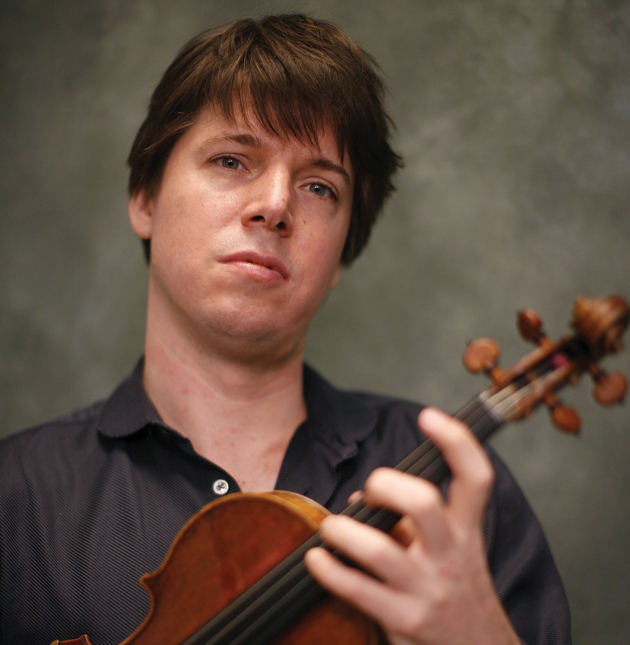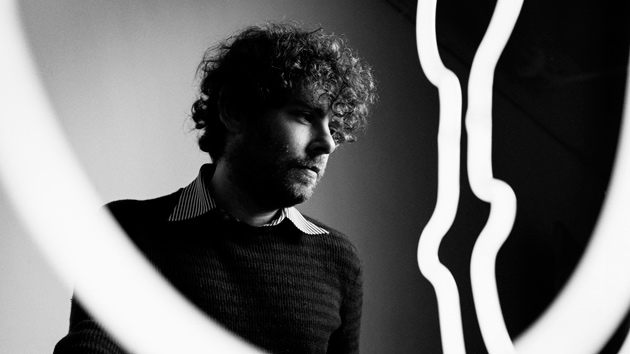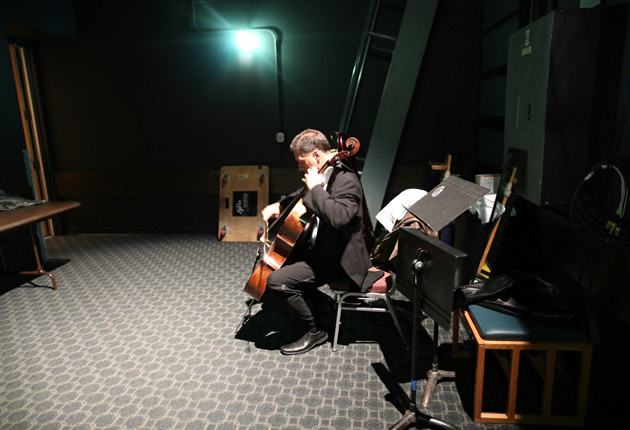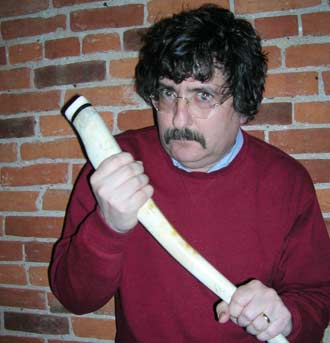
With his mop-top and boyish looks, Joshua Bell more resembles the fifth Beatle than a virtuoso to rival Itzhak Perlman and Jascha Heifetz. But the 44-year-old violinist has dazzled the classical world since before he was old enough to order a beer, touring as a soloist and selling millions of CDs—his latest release, due out January 9, is French Impressions, an album of French sonatas recorded with the acclaimed pianist Jeremy Denk. Along the way, Bell has picked up a Grammy, an Emmy, a Mercury Prize, and a coveted Gramophone Award. When composer John Corigliano accepted the best original score Oscar for The Red Violin in 1998, he credited Bell for playing it “like a god.” Yet when we sat down to talk in a San Francisco hotel lobby the morning after a performance at Davies Symphony Hall, Bell—clad in jeans and T-shirt, and absent his $4 million Stradivarius—seemed disarmingly mortal.
Mother Jones: Last night’s encore, the Yankee Doodle Variations, was like a Cirque du Soleil act!
Joshua Bell: [Laughs.] Yeah, well, I took it from a piece written in 1840 by Vieuxtemps, who after Paganini was sort of the Cirque du Soleil. Paganini took the violin to a level that had never been seen before. He was probably one of the most famous people in Europe. That was in the early 19th century, and back then we didn’t have rock music but he was like a rockstar. One of the next ones was Vieuxtemps. He came to America for a tour when he was 20 years old, and heard the Yankee Doodle song and came home and wrote a set of variations on it. I took that piece and kind of rearranged it for myself and solo violin.
MJ: My friend, who is a really good violinist, called it “showy.” How many pros could pull it off?
JB: Delivery is everything. Any student could play all of the notes. We like to categorize things into showy things and deep things, you know, and things that are high music—important music—and shallow music. And I think that’s dangerous, because there’s often a mix of both. For instance, Bruch [Violin Concerto No. 1], the main piece I played, is for me a very profound work. Because it’s so lush and so emotional, some people think of it as being corny. They say that about Tchaikovsky’s symphonies. If it happens to be popular to the common people, and accessible, it’s often thought of as being not great. It’s sort of an elitist thing. In art and music, particularly in the 20th century, there was a big period there where for something to be called profound you had to not be able to understand it.
MJ: Is that still the case?
JB: I think it’s swinging back a little bit. But composers say, “We have to reflect our times because we live in ugly times.” This I think is the most hilarious thing in the world. We live in the least ugly time in history. If you look at back when Beethoven was writing, half the kids were dying, mothers were dying at childbirth, there were more wars going on then than there are now. People wrote the most beautiful things during the ugliest times. I get on a rant about this because I don’t need to hear ugliness in music. That’s where I go for beauty.
MJ: Do you write?
JB: A little bit. The cadenzas I write. I write arrangements. I’m sort of a wannabe composer. My last album, At Home With Friends, the most fun tracks I did were a few I wrote with Regina Spektor, where I just kind of took one of her songs and just made it into a violin and voice thing. Or “Eleanor Rigby”—of course the tune was written, but it was fun to take that and make it into sort of a fantasy piece.
MJ: Now in the old days, the cadenzas were improvised, right?
JB: In the very old days. I think even by the time it got to the 19th century, people were already writing, I mean, even Beethoven was already writing out the cadenzas because they were already getting more and more elaborate.
MJ: I gather your family was pretty musical.
JB: I grew up in a musical family, but nobody was a professional musician. I’m the middle child. I have two sisters—or three, actually—just in case she’s reading. [Laughs.]
MJ: Was there any sibling musical rivalry?
JB: They were talented, but I very quickly was getting a lot of attention for the music and I think it was sort of enough. They pulled away and did their own, other things.
MJ: But you would play together.
JB: It was more like there was always someone practicing, or my mother playing the piano, or family gatherings like Christmas. We called them family musicales. All the cousins and everybody played something, one at a time mostly.
MJ: Were your childhood heroes athletes and rockstars, or great composers?
JB: It was both. I was really into sports growing up, playing tennis and basketball. My musical heroes started around the age of 11 when I went to a summer camp called Meadowmount; it’s a famous summer camp in upstate New York where Itzhak Perlman and [Pinchas] Zuckerman and all those guys used to go. I went there at 11, and that kind of opened my eyes—that’s where someone first gave me a tape of Jascha Heifetz, the greatest violinist of the 20th century. And I used to sneak, to listen to his cassette tape in bed after lights out. That was the first time I had a musical hero, and that I would listen just for the sake of pleasure. And my teacher became my hero, actually—Josef Gingold.
MJ: How’d you meet him?
JB: Well, I actually had my first lesson with him at that summer camp, where he would teach. I also grew up a mile away from him in Bloomington, and he was a legendary teacher teaching at Indiana University. So location was very on my side music-wise.
MJ: Most stories about child prodigies involve a really intense parent.
JB: Oh, I had intense parents. I mentioned Christmas, but I also have the stereotypical Jewish mother. They were very involved, particularly my mother. My father was a psychologist and workaholic, in a way, but also—different kind of relationship. If I got a bad review, he would be the one most affected by it. He was very intense. But my mother—
MJ: And she played piano?
JB: Yes, she accompanied me for awhile. She got very, very nervous when we would start playing a concert, so I stopped having her as my accompanist early on. [Laughs.]
MJ: I read that your parents fought to get you into first grade at age five, is that right?
JB: Yeah, they were always fighting for me to foster the things I was interested in. They taught me to read very young, and really fought for me to move up a grade. I wanted to as well. I was bored in the class.
MJ: Was being the youngest in your class difficult?
JB: At the time, the school system said, “When he’s 13 and the girls are 14, he won’t be able to adjust socially” and all this stuff. It was all about the social adjustment and being like everybody else. The irony is that, when I was 12, that’s when I went to college. All my friends were 20, 21, and I was 12. It didn’t even occur to me that that was strange. I wasn’t involved in high school much; I never went to the prom—all my friends ended up being almost 10 years older than I was.
MJ: I started my daughter on violin at five, and it’s a parenting balance. You started even earlier. What’s the psychology of getting a four-year-old to practice?
JB: I have a three-year-old now, and twins too. He likes to pick up the violin for a second and then wants to do something else. I don’t know how I will deal with that if I want to make him practice. Because you have to find the right balance. Kids need to be structured in some way, but you don’t want to force something down their throats that they have no interest in.
MJ: They also often resist things their parents excel at.
JB: Yeah, yeah. I remember hating getting criticism from my mother in particular, especially if she’s right, and I knew she was right. (And I knew she was right.) It would just drive me crazy.
MJ: What’s your view of the Suzuki method?
JB: I think it’s a good way to get kids interested young, and they play together, and it’s a social thing. But I’m not sure I’m all that keen about learning only to play by ear. I think it’s important to learn to read music right off the bat. I never took traditional, strict Suzuki lessons.
MJ: I gather your mentor wasn’t too strict.
JB: Quite the opposite. Gingold was exact opposite of the cliché, hard, strict teacher.
MJ: At your level, you’d sort of expect some intense Russian coach.
JB: Well, that’s that old traditional Russian school, and that can be effective as well. Different kids respond to different teaching; there’s not one way. His way was just through bombardment of kindness and joy. [Laughs.] What would be the opposite of shock and awe? Because of that, you just wanted to please him. It was more of, by association with someone that loved something so much, it just rubbed off. He didn’t spoon-feed his kids how to play every little thing; he was good teacher because he guided me but let me think for myself and learn for myself. He never answered the questions; he kind of asked more questions.
MJ: And made you want to excel?
JB: And also figure it out for myself. I think the figuring out process is a big part of learning. He also was a great violinist. There are some great teachers who have had great students, but they themselves can’t play a note. I don’t understand it, because the most I learned from my teacher was just hearing him play.
MJ: Well, you know the old cliché about teaching.
JB: That is a cliché, but if you’re going to take tennis lessons, you want your tennis teacher to be able to hit the ball. [Laughs.] And Gingold would always play better than even his best students. In the master classes, they would play and they would sound good, and then he would get up and you’d go, “Ah, that what it’s supposed to sound like.”
MJ: Can you recall a moment when you kind of said, Wow, I’m really fuckin’ good at this?
JB: [Laughs.] Well, it wasn’t quite like that. In kindergarten, before I went to first grade, I had just started the violin. A kid came in for show and tell and brought his violin and played. And, I was looking at everybody, from person to person, because it was so bad. I was like, “Does anybody realize how bad this is?” And everyone’s like, “Oh, fantastic” and the teacher was saying, “Oh, it’s so great.” I remember being completely perplexed, because I had never really heard anyone else play, and it came rather quickly to me.
MJ: Did you ever play at show and tell?
JB: At various points. But in middle school I was never put at the front of the orchestra. I mean, when our local orchestra went to the state level, I was chosen as the concert master of the state orchestra, yet in my own backyard I was always kind of put in the middle, which was kind of discouraging. They didn’t look to me as a mentor. I think that there’s a fear in schools of singling kids out as excelling. I watched a TV special about kids who played Annie on Broadway. One girl played Annie on tour for two years as a 13-year-old, and came back to her own school, and they had a production. And she was traumatized because somehow she was discouraged from having any involvement in their production of Annie. They were so threatened by the fact that she got this world renown that it would be bad for the other kids if she was too celebrated. I don’t like that kind of thing. I see that among other colleagues who were always sort of put in their place as a kid. I don’t believe in that.
MJ: You’ve certainly had your share of acclaim. It’s quite effusive, some of it. Like the Interview magazine quote that your music “does nothing less than tell human beings why they bother to live.” What do you make of stuff like that?
JB: There’s also, I don’t include the bad quotes in my PR materials! [Laughs.] I mean, that’s nice. It’s a great job! You get thousands of people clapping after you do your job, which is amazing. Not everybody who goes to work gets that at the end of the day. Even movie actors tell me they’re jealous of the fact that we get the immediate applause. When they’re filming movies they don’t get that.
MJ: They just get the groupies.
JB: [Laughs.] Exactly. But in the end, I am so hard on myself. In fact, it was very hard for me to accept compliments for a very long time. I sort of learned to do it. Because I wanted to say, “Are you kidding? That sucked!” I always feel like I could have been better. You have to have that, because if you think you’re great you’re not going to get better. But I once had a guy stop me on the street who said something really over the top, but kind of sincere: “I saw your concert, it was the best night of my life” or something like that. And I was so uncomfortable with it, I said, “Well, you need to get out more!” He seemed horrified, and I felt so bad afterwards. I thought I was being self-deprecating, and I realized that that’s not what someone like that wants to hear. So I’ve had to learn how to just say thank you.
MJ: So, like most kids, you were into video games. Think there’s a market for a game called Fiddle Hero?
JB: I was more than into video games. I was addicted. Really, looking back, I think I had a severe addiction, with all the classic symptoms of anxiety and release and things that go along with it. I remember going out the back door of the music school where I should have been practicing. My mother would drop me off and I’d go out the back and literally break into a sprint to get to the arcade, feeling that rush of like—I’ve never done drugs but apparently it’s like that—I’d walk into the arcade and I’d just feel this euphoria. [Laughs.] Thank god I’ve never done drugs, because I think I have an addictive personality! This was in the ’80s, so all the Donkey Kong and Pac Man and Centipede—I had the local high scores on several of those machines at one time. But yes, I have been talking to some people about exploring the idea for some kind of violin video game. We’ll see.
MJ: Glenn Gould supposedly once threatened to sue a guy for shaking his hand. Are there any activities you avoid to protect your hands?
JB: Um, doing dishes. [Laughs.] No, just because I don’t like doing dishes—it’s a great excuse! Yeah, I’m careful around knives, cutting things, because I’ve seen several people in my business chop off the tips of their fingers. But I’m not that careful; I’ve gone on stage twice with crutches because of severely sprained ankles from basketball. And I’ve jammed most of my fingers at one time. I like to ski, but I’m careful on the slopes, because if I break an arm… I shouldn’t be doing it all, but you can’t live in fear all of the time.
MJ: Tell me how you came to purchase your violin.
JB: I sort of worked my way up. I bought my first Strad when I was 19.
MJ: How does a 19-year-old afford a Stradivarius?
JB: Well, this one didn’t have some original parts; it was an unusual one because it was shaped like a guitar—but it was made by Stradivarius and it had a good sound and I bought it for $140,000. Which was a lot of money, but I could take out a loan and I bought it. A few years later, I tripled my money, and put a down payment on my next Strad.
MJ: Like real estate!
JB: Yeah. That one was a million two, a beautiful violin. I owned that when I went into the shop of Charles Beare, a famous London violin dealer. And they said, you should try this violin. It’s leaving tonight to go to Germany. Some businessman has an interest in buying it, but you should take a play on it. He said it’s the Gibson ex-Huberman [Stradivarius]. They left me alone with it for a minute, and I just started getting more and more excited, and I was like, “This is the violin I’ve been looking for!” The way it responded to me; it was like, meant to be. It just felt like mine.
MJ: Like in Harry Potter, where the wand chooses the wizard!
JB: Yeah, so the dealers walked back in and I said, “This is my violin, I’ve got to have it.” Which is not what you should be saying to people you’re starting to negotiate with. But I played on it that very night at the Royal Albert Hall for 8,000 people—a very complicated, difficult piece. Technically I should have had a month to get to know the instrument before I played it, but I just did not want to part with it. And then it was still not over, because I had to come up with the money. I had to sell mine to buy this one, and you can’t just turn around and sell it overnight. I had like one month. Anyway, I ended up by chance running into someone that fell in love with my violin; he found a sponsor and I got the money for the new violin on the exact day of the deadline! So it was meant to be.
MJ: Isn’t that kind of like dumping your sweetheart for a new lover?
JB: It is, it is. I would have liked to have kept them both.
MJ: Describe your emotional relationship with your violin.
JB: I don’t want to carry the analogy too far, because it can get a little corny. I don’t sleep with it in my bed, but there is something very magical about the instrument. You open up the case; it’s a masterpiece, it’s gorgeous, the varnish is still there from 300 years ago. People who know violins, they look at it and it’s almost like a face. So I open up my case every day, and have one of the great creations. It is very inspiring. It makes you want to practice. How can you open up a case and look at a violin that was made in 1713 by one of the greatest artists in history and then say, “No, I don’t feel like practicing today.” [Laughs.] You step up to the plate.
But there are days that I get neurotic with the instrument. Every little adjustment will change the balance for good or for bad. It’s kind of a miracle, the way the whole thing works as an acoustical whole, so perfectly balanced that any little thing will—which also means the weather, the humidity. There are some days I take it out and it feels dreadful, like nothing is responding, and I want to sell it and get rid of it. And the next day suddenly the skies open up and the sound is glorious again. So it’s like a relationship: There are good days and bad days.
MJ: How important is the bow?
JB: Extremely important. As important.
MJ: Some of these François Tourte bows sell for more than $100,000. Are they strung with unicorn hair?
JB: [Laughs.] That’s funny. The price is supply and demand. There aren’t that many of them and they are not making any Tourtes anymore. But there’s something about the sound that it gets, especially out of a great Italian instrument, the way it makes the violin resonate in a way that makes a big difference. It’s also the feel. There’s so much that happens with the bow; it’s got to do many things, and be balanced and just right.
MJ: Modern bow-makers can’t replicate that?
JB: There are several great modern bow makers, but compared to a Tourte? Some of it is maybe that pernambuco wood, which is what they use, is getting harder to find. It’s endangered, except the amount of wood used for bows is so miniscule that it’s almost laughable to worry about bow makers.
MJ: So, how much of the classical repertoire do you think is any good?
JB: Most of it. The bad stuff has been weeded out already. Of course there are pieces that I don’t like, but generally I’d say the classical repertoire that has survived has survived because it’s great. Beethoven, Mozart, and Brahms and these people have stood the test of time—I can confidently say that these were the greatest composers—and Bach, of course. With rock music, so much of it is flash in the pan. And in the 17th century there were flashes in the pans, too. Someone once told me that there were four Franz Schuberts in the musical dictionary of the time and not one of them was the Franz Schubert we know today!
MJ: Desert island question: You’re stuck with the works of one composer…
JB: Ooh, that’s a hard one. I’d have to say Beethoven.
MJ: You’ve done a number of film soundtracks, including The Red Violin. It struck me, preparing for this interview, that soundtracks are one of the few places we ever hear classical music.
JB: For the masses, absolutely. I always find it funny when people say, “I don’t really like classical music” or “it doesn’t do anything for me.” I tell them, “Well, you know, it does. You go to films and you’re responding to it, and you’ve heard it…”
MJ: And it’s controlling you.
JB: It’s controlling you! So don’t think you’re not being affected. It’s a great medium for music.
MJ: Because you’ve got a captive audience?
JB: Yeah, and it plays a huge role. I mean, the music in Star Wars, I can’t imagine what the movie would have been like without it. It made the film.
MJ: What non-classical music would your fans be surprised that you listen to?
JB: I’m not a good example. [Laughs.] I don’t listen to a lot of music when I have my free time. But you know, I’ll go to a jazz club and have a drink and listen to a good jazz musician. Or sometimes in the morning, if I want to put myself in a good mood, I’ll put on some Latin music.
MJ: Let’s talk Vivaldi. I can understand why any violist would want to record The Four Seasons, but it’s been recorded by so many of the greats. Why tread where so many others have gone?
JB: As a classical musician, you’re always treading where so many people have gone. That’s what we do.
MJ: But the Vivaldi in particular feels so overexposed.
JB: Well, if anything, Vivaldi has so much more room than almost anything else for being individual. Baroque music was very much like jazz in that a certain amount was written out and there’s a lot that’s just—the harpsichord player is improvising the whole way through; he’s got the charts like jazz players have. And the violinist as well. There’s room to ornament and improvise things. That’s why we go back. Actors want to do Shakespeare again and again, or want to do Hamlet. When you hear one guy do Hamlet and another guy do it, it’s going to be a whole different experience. For me, the recording is more about posterity—for my grandkids, and for my own documentation of my version when I was 35.
MJ: What’s the most technically difficult piece you’ve ever performed?
JB: It’s not always what seems hard. The Beethoven violin concerto is technically maybe the hardest because it’s so exposed. The Tchaikovsky is more technically difficult; it’s got more acrobatics, yet you can get away with more.
MJ: What do you mean, exposed?
JB: If you mess up the tiniest little thing in the Beethoven concerto, or the phrasing isn’t just exactly perfectly executed—Beethoven brings out the worst in the best violinist. You almost never hear a satisfying performance, because it doesn’t play itself. The Tchaikovsky is technically bombastic, but it kind of plays itself.


















